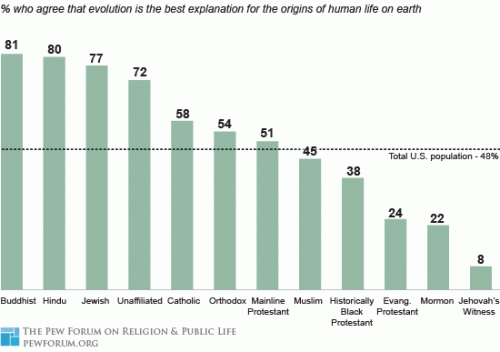Blogging for the Chicago Tribune, Stephen Asma recently wrote about Buddhists and evolution:
Turns out, many American biology teachers like Beau Schaefer are sneaking creationism into their classrooms. Buddhism, like every philosophy, has many problems, but thankfully it doesn’t have this one. In fact, Buddhists are all about the evolution.
Buddhism doesn’t have a creator God, like we find in the book of Genesis, nor does Buddhism have the Fundamentalist problem of a literal interpretation of scripture. As a result, it’s never had a war with science, unlike the science-religion skirmishes that plague Christianity and Islam.
To back this claim up Asma cites a 2009 Pew Forum poll that shows that 81% of Buddhists think evolution is the best explanation for the origins of human life on earth.

Of all the religious groups included on the chart, Buddhists are the most accepting of evolution. This supports the familiar claim that Buddhism and science overlap and inform each other, but does Buddhism really embrace evolution? What about the places where Buddhism and science don’t see eye to eye? In 2003, Tricycle interviewed science writer Robert Wright on where natural selection and Buddhism meet—and don’t. The first Q&A from “Darwin and the Buddha“:
One of Buddhism’s central tenets is the illusory nature of self. How does that square with evolutionary theory? Well, commenting on the metaphysical status of the self is above my pay grade, and I’m not sure that a Darwinian perspective sheds much direct light on it. But this perspective does help to explain another, and perhaps related, illusion about the self: the “specialness of the self.” People instinctively operate under the assumption that their own happiness is more important than other people’s happiness. And that’s because we were built by natural selection, which is all about self-preservation and self-interest. So Buddhism’s emphasis on surrendering self-interest in consideration of other beings is radically opposed to Darwinian logic.
Read the rest here.
Thank you for subscribing to Tricycle! As a nonprofit, we depend on readers like you to keep Buddhist teachings and practices widely available.